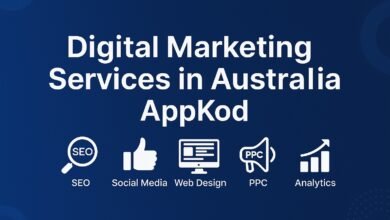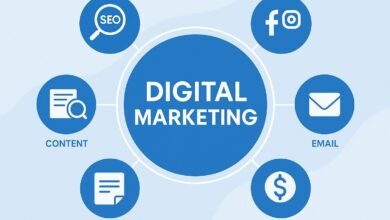How to Start Your Online Marketing Business: A Comprehensive Guide

Understanding Online Marketing
Online marketing, often referred to as digital marketing, encompasses a range of strategies and techniques used to promote products or services over the internet. As businesses increasingly move their operations online, understanding online marketing has become essential for success in the digital landscape. The importance of online marketing lies in its ability to reach a global audience, engage consumers interactively, and provide measurable results, making it a powerful tool for businesses regardless of size.
At its core, online marketing is composed of various key components. Search Engine Optimization (SEO) is crucial for improving a website’s visibility on search engines such as Google. By optimizing content with relevant keywords and enhancing site performance, businesses can increase organic traffic and attract potential customers looking for their offerings. Another vital element is content marketing, which focuses on creating valuable, relevant content to engage and inform the target audience, ultimately driving conversions and building brand loyalty.
Social media marketing has gained immense popularity, allowing businesses to connect with consumers on platforms like Facebook, Twitter, and Instagram. These channels facilitate direct interaction with customers and offer a space for sharing content, promoting products, and fostering community. Additionally, email marketing remains a potent strategy for nurturing leads and maintaining engagement, delivering personalized messages directly to a subscriber’s inbox.
PPC (Pay-Per-Click) advertising offers businesses a way to gain immediate visibility on search engines and social media platforms through paid campaigns. This model allows for precise targeting and budgeting, making it an effective method for driving traffic and conversions. Understanding these components is vital for anyone looking to delve into how to start an online marketing business, as they represent the foundational elements that can significantly impact a brand’s online presence and success. As the digital ecosystem continues to evolve, mastering online marketing strategies will be indispensable for businesses aiming to thrive in an increasingly competitive market.
Identifying Your Niche
When considering how to start an online marketing business, the first crucial step involves identifying a profitable niche. This process begins with extensive market research to understand current trends, consumer behavior, and the competitive landscape. By gathering relevant data on potential markets, aspiring marketers can uncover opportunities that align with their interests and expertise.
Understanding your target audience is a vital component of niche identification. Segmenting the audience by demographics, interests, and buying behaviors enables you to create tailored marketing strategies that resonate with them. Employ various tools such as surveys, social media analytics, and online forums to gather insights about your target audience’s preferences and pain points. This knowledge not only adds depth to your marketing approach but also enhances the potential for higher conversion rates.
Next, it is essential to evaluate the competition in the identified niches. Use tools such as SWOT analysis to assess competitors’ strengths and weaknesses. Understanding what others in the field are doing well and where they fall short can provide you with valuable insights. Identifying gaps in the market enables you to carve out a unique selling proposition (USP), a crucial aspect of standing out amid fierce competition. Your USP should reflect distinct features or benefits that your business offers, which competitors may lack.
Moreover, aligning your personal interests and expertise with market demand is key to achieving success. Passion for a particular niche often translates into commitment and sustained effort, both of which are necessary for a thriving online marketing business. Thus, a harmonious balance between what you enjoy and what is currently sought after in the market can lead to sustainable growth and profitability. By meticulously following these steps, you set a solid foundation for your online marketing journey.
Crafting a Business Plan
Creating a structured business plan is a pivotal step for anyone considering how to start an online marketing business. A well-documented business plan serves not just as a roadmap but as a vital tool for attracting investors and guiding your operations. The components of a comprehensive business plan typically begin with an executive summary, which offers an overview of your business concept. This summary should clearly outline your vision, mission, and the unique value proposition that will set your online marketing business apart from competitors.
Next, defining your business objectives is essential. These objectives should be specific, measurable, achievable, relevant, and time-bound (SMART). By setting clear goals, you will have a solid foundation upon which to build your strategies and measure your progress. Additionally, your plan should encompass the marketing strategies you intend to employ to reach your target audience. This includes identifying your target market, conducting a competitive analysis, and outlining your tactics, such as search engine optimization (SEO), content marketing, or pay-per-click advertising.
Financial projections are another key element that investors look for in a business plan. Your financial section should include detailed forecasts for revenue, profit margins, and expenses, along with funding requirements. This segment not only demonstrates your pricing strategy but also shows potential investors that you have a clear understanding of the financial landscape of your online marketing business.
Finally, your operational plan is necessary to establish how your business will function daily. This section should detail the logistics of running your business, including staffing, technology requirements, and workflow processes. A well-thought-out operational plan ensures that you can efficiently execute your strategies and adapt to any changes in the digital marketplace.
Building an Online Presence
To successfully embark on the journey of how to start an online marketing business, establishing a robust online presence is paramount. The fundamental starting point is the creation of a professional website. Your website acts as the virtual storefront for your business, and it should reflect your brand identity clearly. A well-designed website, easy navigation, and quality content not only enhance user experience but also serve as a testament to your professionalism.
Once your website is ready, optimizing it for search engines becomes essential. Search Engine Optimization (SEO) involves employing strategies to improve your site’s visibility on search engine results pages. This includes utilizing relevant keywords, building backlinks, and ensuring fast loading times. Focus on creating high-quality, engaging content that addresses the needs of your target audience, as this will greatly enhance your chances of ranking higher in search results and attracting potential clients.
Furthermore, a comprehensive social media strategy is vital for driving traffic to your website and enhancing your online presence. Identify the social media platforms most frequented by your target demographic and develop a content calendar that encourages regular engagement. Posting valuable content, responding to inquiries, and participating in discussions can significantly boost your brand’s visibility and credibility. Ultimately, being active on social media allows your marketing business to build relationships with potential clients, enhancing overall trust in your brand.
Additionally, leveraging online directories can further establish your presence. Listing your business in reputable directories increases your visibility and allows potential clients to find your services more easily. Ensure that your listings are accurate and up-to-date to maintain credibility. Together, these steps will significantly contribute to creating a strong online presence, a crucial element in the pursuit of how to start an online marketing business effectively.
Developing Your Marketing Strategy
Creating an effective marketing strategy is essential for anyone looking to establish an online marketing business. A well-formulated strategy not only identifies your target audience but also outlines how to effectively engage with them. Utilizing various tactics such as content marketing, social media management, paid advertising, and email marketing will help in establishing a cohesive plan aligned with your business goals.
Content marketing is a foundational aspect of any online marketing business. By producing high-quality, informative content, you can attract and retain a clearly defined audience. This involves creating blog posts, videos, and infographics that provide value to potential customers. Ensuring that your content is optimized for search engines increases visibility, which is crucial for attracting traffic. Therefore, when thinking about how to start your online marketing business, integrating a robust content marketing strategy should be a top priority.
Social media platforms present an excellent opportunity for outreach. Engaging with your audience on channels such as Facebook, Twitter, and Instagram allows for real-time interactions and fosters community building. Tailoring your content to fit the preferences of each platform enhances engagement. Analyzing metrics from these campaigns will help refine your approach and ensure that you are reaching your goals effectively.
Paid advertising is another powerful component to consider. Utilizing pay-per-click (PPC) strategies can place your brand at the forefront of relevant searches. Moreover, platforms like Google Ads and social media ads enable precise targeting of your desired demographics, ensuring that your marketing efforts yield the highest return on investment.
Email marketing rounds out your strategy, providing a direct line of communication with your audience. By segmenting your email list and providing personalized content, you can improve customer relationships and retention. Using email marketing tools to automate campaigns and track performance can significantly enhance your efficiency.
In conclusion, developing a comprehensive marketing strategy requires a multi-faceted approach that aligns with your business objectives. By leveraging content marketing, managing social media campaigns, using paid advertising, and focusing on email marketing, you can successfully navigate the complexities of starting an online marketing business.
Understanding Analytics and Metrics
In the realm of online marketing, understanding analytics and metrics is crucial for the success of any business. To effectively learn how to start your online marketing business, one must grasp the importance of tracking and measuring the performance of marketing strategies. Analytics tools provide a wealth of information that can help marketing professionals make data-driven decisions to optimize their campaigns.
There are various analytics tools available in the market, each offering unique features and insights. Google Analytics is one of the most widely used platforms, allowing users to track website traffic, user behavior, and conversion rates. Additionally, social media platforms such as Facebook and Instagram offer their own insights for evaluating engagement and reach. These tools can provide an overview of how well your marketing efforts resonate with your target audience.
Key performance indicators (KPIs) play a significant role in assessing the effectiveness of an online marketing campaign. These metrics can include website traffic, bounce rate, click-through rates (CTR), and return on investment (ROI), among others. By focusing on the right KPIs, marketers can evaluate whether their campaigns are meeting predefined goals, thereby enabling them to implement necessary adjustments. For example, if conversion rates are low, one might consider revisiting their call-to-action or the overall user experience on their website.
Interpreting the data gathered from these analytics tools is essential for making informed decisions. Marketing teams should regularly review and analyze performance metrics to identify trends, pinpoint areas of improvement, and evaluate audience engagement. This analytical approach not only helps businesses refine their marketing strategies but also empowers them to adapt to changing market conditions. In the ever-evolving digital landscape, staying on top of analytics and metrics is foundational for successfully launching and sustaining an online marketing business.
Legal Considerations and Compliance
Starting an online marketing business entails various legal considerations that must be meticulously addressed to ensure compliance and avoid potential pitfalls. First and foremost, business registration is a crucial step. Depending on your location, you may need to register your business as a sole proprietorship, partnership, or corporation. This process often involves selecting a unique business name and ensuring it complies with local regulations, which vary by jurisdiction.
Furthermore, understanding the tax implications of your online marketing business is essential. This includes familiarizing yourself with local, state, and federal tax requirements. Accurate bookkeeping practices should be implemented from the outset to track income and expenses, making tax filing more straightforward. Consulting with a tax professional can provide valuable guidance on how to navigate this aspect effectively.
Intellectual property rights play a significant role in online marketing. Marketers must be aware of copyright laws when utilizing content from third parties, such as images, videos, and texts. Obtaining permissions, using public domain resources, or subscribing to stock libraries can mitigate the risk of infringing on copyright protections. In addition, it is advisable to protect your own creations by considering trademarks or copyrights to secure your content.
Data protection regulations, particularly the General Data Protection Regulation (GDPR), are pivotal in modern marketing frameworks. Understanding how to collect, store, and process consumer data in compliance with GDPR is essential for building a trustworthy online presence. This entails creating comprehensive privacy policies and offering users clear options regarding their data preferences.
Lastly, it is vital to adhere to online advertising guidelines, which include platforms like Google and Facebook, ensuring that ads are truthful, not misleading, and comply with all regulatory standards. By being diligent in these areas, you can successfully navigate the legal landscape as you learn how to start an online marketing business while safeguarding your enterprise from legal repercussions.
Building Relationships and Networking
In the realm of online marketing, establishing strong professional relationships and networks is paramount to the success of one’s business. The digital landscape is inherently collaborative, and marketers who actively seek to build connections can greatly enhance their business opportunities. Knowing how to start an online marketing business involves not just strategic planning and execution; it also requires cultivating a community of professionals who share similar goals.
Connecting with other marketers is a fundamental first step. Engaging with peers either through social media platforms such as LinkedIn or participating in local networking events can provide numerous benefits. These connections often lead to valuable exchanges of ideas, marketing strategies, and best practices. Additionally, collaborations on projects can arise from these interactions, which not only expand one’s skill set but also bolster the visibility of each party involved.
Joining industry groups and forums is another effective strategy for networking in the online marketing arena. These platforms serve as gathering points for like-minded individuals seeking to discuss trends, challenges, and innovations in marketing. By actively participating in these groups, marketers can position themselves as knowledgeable resources while also forging connections with potential partners or clients.
Leveraging partnerships can further enhance the reach of an online marketing business. Forming alliances with other companies or influencers can significantly broaden an audience base. By pooling resources and expertise, businesses can embark on joint ventures that might not be feasible independently. Whether it’s through affiliate marketing arrangements or content collaborations, partnerships can create mutually beneficial opportunities that drive growth.
Ultimately, the emphasis on building relationships and networking cannot be overstated in the context of how to start an online marketing business. These connections not only foster community support but also pave the way for future collaborations and success in an increasingly competitive market.
Scaling Your Online Marketing Business
Once an online marketing business has been established, focusing on strategies for scaling becomes essential for long-term success. The first step in scaling is often to expand service offerings. This involves analyzing the current demands of existing clients and identifying additional services that could enhance their marketing strategies. For example, if an agency specializes in social media marketing, it might consider adding content creation or search engine optimization (SEO) services to attract a broader client base. By diversifying service offerings, the business can cater to a wider audience and meet varying client needs, ultimately leading to increased revenue.
Diversifying income streams is another crucial aspect of scaling an online marketing business. This can be achieved through various methods, such as developing digital products, launching online courses, or offering consultancy services. These additional revenue avenues not only provide financial stability but also enable the business to engage with clients beyond the traditional service model. For aspiring entrepreneurs learning how to start an online marketing business, exploring diverse income opportunities will enhance profitability and sustainability.
Employing automation tools is pivotal for efficient scaling. By integrating software solutions that automate tasks such as email marketing, social media posting, and analytics reporting, online marketing businesses can save time and allocate resources more effectively. This not only streamlines operations but also reduces human error, allowing teams to focus on strategic growth initiatives instead of routine tasks.
Lastly, leveraging partnerships can facilitate growth for an online marketing business. Collaborating with complementary service providers allows for mutual referrals and broadens the reach within target markets. Establishing these alliances can create a network of resources and support essential for scaling. In conclusion, by strategically expanding services, diversifying income, utilizing automation, and forming partnerships, entrepreneurs can successfully scale their online marketing businesses, adapt to market demands, and ensure sustained growth. With careful planning and execution, the potential for expansion is substantial.



